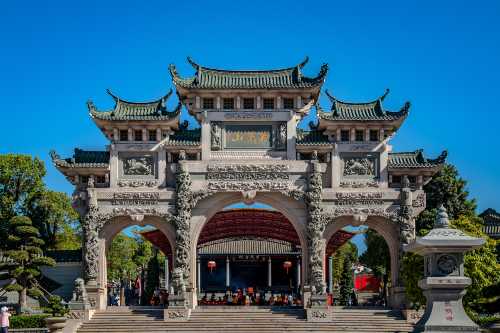Popular Trip Moments
Shanwei Treasure Place | Fengshan Mazu | In California, it's like Shanwei~ | Beautiful night view of Shanghai Bund | Shangchen Tianhou Temple | Travel to a city for a song, and fall in love with the Bund! | Zhaoqing Hukeng Village Guide | Treasure Hunt at Jinxiang Silver Beach | Rafting on the Luo River: Shui Bizi's Math Lesson | Self-driving during the Spring Festival holiday in Lufeng small village with few people along the coastal scenery national highway | Lufeng Donghai food, go eat it all!!! | Northwest China | Shanwei Lufeng! ! No one found it here! | See the sea around Guangdong... discover a beautiful, uncrowded, free coastline. | It was great to stay at Lufeng Ouxia·Mediterranean Hotel! Great value for money. | "Bars in Hong Kong" | Trace the revolutionary footprints in Lufeng, Shanwei. | I regret not discovering this hotel sooner before! | Shanwei, Guangdong, and the Bund, Shanghai. | Shizhai, Lufeng, Shanwei, Guangdong - The Lost Stone City | Lufeng, Shanwei: Explore the underrated food capital. | Xuanwu Mountain | The mountain is not high, but the spirit is sincere. | I really regret not coming to this hotel earlier, it's perfect | "Xiangshui Reservoir: beautiful mountains and rivers, you will never want to leave" | Qian'ao Beach | Meet the most beautiful corner at the beach in Shanwei! | Xuanwu Mountain | Xuanwu Mountain in Shanwei is very effective and free to visit | At Shanwei! A super niche beach camp! This is where I'm spending my holiday | Xinzai Village of Shizai Village, Lufeng, Guangdong
Recommended Attractions at Popular Destinations
Bangkok attraction near me | Manila attraction near me | Tokyo attraction near me | Taipei attraction near me | Hong Kong attraction near me | Seoul attraction near me | Kuala Lumpur attraction near me | Los Angeles attraction near me | Shanghai attraction near me | New York attraction near me | Shenzhen attraction near me | Osaka attraction near me | Singapore attraction near me | London attraction near me | Guangzhou attraction near me | San Francisco attraction near me | Beijing attraction near me | Macau attraction near me | Bali attraction near me | Jakarta attraction near me | Paris attraction near me | Ho Chi Minh City attraction near me | Istanbul attraction near me | Phuket attraction near me | Chicago attraction near me | Seattle attraction near me | Toronto attraction near me | Orlando attraction near me | Cebu attraction near me | Chiang Mai attraction near me
Popular Attractions
Prince Kung's Mansion | Yu Garden | Nanxi River Scenic Area | Universal Beijing Resort | Fengqiao Scenic Area | Guangdong Science Center | Gan Haizi | Chaoyang Tower | West Great Wall | Jinsha Site Museum | Shanghai Wild Animal Park | Daming Palace National Heritage Park | War Remnants Museum | Oriental Pearl Radio & Television Tower | Corto Divers Dive Centre | Yingyuetan Hot Springs | Dujiangyanshui Culture Square | The Big Buddha Temple | Old Quarter | Nurul Huda Great Mosque | Marina Club of Homeowners Association | Baitussalam Mosque | Masjid Jami babussalam | Morro São Caetano | Nhà thờ Họ Bùi Văn | South Natick Falls | Klub Tamansari Bali View | Piazza Paolo VI | Masjid Al Hidayah | Safari Park Shenzhen
Popular Restaurants in Lufeng
几木(华庭店) | 山海湾渔港 | 胖姥姥(岁宝陆丰店) | Xuanwushan Restaurant | 小禾寿司(龙山店) | 麦当劳(陆丰店) | 人民大厦美食菜馆 | 绿源鲜榨果汁(红星店) | 迎仙大排档(南堤路店) | Lujiadian (lufeng) | 煌牛食府牛肉火锅(全美家居城店) | Hualaishi | 金麦轩(新华苑店) | 集香客家养生油茶(陆丰东海店) | 华莱士·全鸡汉堡(龙山路店) | Yulongchalou | 马街头肠粉 | 幸福侯彩擂(陆丰店) | KEN DE JI SHAN WEI LIU FENG DIAN | XIAN SHENG | TANG CHAO GANG SHI CHA CAN TING | 尊宝比萨(锦江店) | 姐妹饭店(龙山路店) | Fengyesijizhuti Restaurant (lufeng) | 乳鸽王(人民路店) | 一马料理(马街店) | BA SI KE DAN GAO | 月华楼 | 探鱼(陆丰岁宝百货店) | 真功夫(陆丰店)
Popular Ranked Lists
Popular Best Things to Do in Shimian | Popular Luxury Hotels Near En Gev | Popular Luxury Hotels Near Twin Waters | Top 4 Best Things to Do in Daxin | Popular Luxury Hotels Near Kittila | Top 10 Local Restaurants in Hat Yai | Top 9 Local Restaurants in Dongying | Top 6 Local Restaurants in Batam | Top 9 Best Things to Do in Anyang | Popular Luxury Hotels Near Odiaxere | Top 4 Local Restaurants in Fangchenggang | Popular Best Things to Do in Taoyuan | Popular Premium Hotels in Al Shamal | Top 5 Best Things to Do in Gannan | Top 4 Local Restaurants in Xinzheng | Popular Best Things to Do in Renhua | Popular Luxury Hotels Near Fahaheel | Top 10 Local Restaurants in Bengbu | Popular Premium Hotels in Korcula | Popular Luxury Hotels in Paradise Island | Top 4 Local Restaurants in Huludao | Popular Luxury Hotels Near Weiden am See | Top 10 Local Restaurants in Fuding | Popular Luxury Hotels Near Sandakan Division | Popular Best Things to Do in Manzhouli | Popular Premium Hotels in Ukhiya Upazila | Top 19 Local Restaurants in Shaoxing | Top 5 Best Things to Do in Zhaotong | Popular Best Things to Do in Gulin | Top 9 Local Restaurants in Liuyang
Payment Methods
Our Partners
Copyright © 2025 Trip.com Travel Singapore Pte. Ltd. All rights reserved
Site Operator: Trip.com Travel Singapore Pte. Ltd.
Site Operator: Trip.com Travel Singapore Pte. Ltd.















